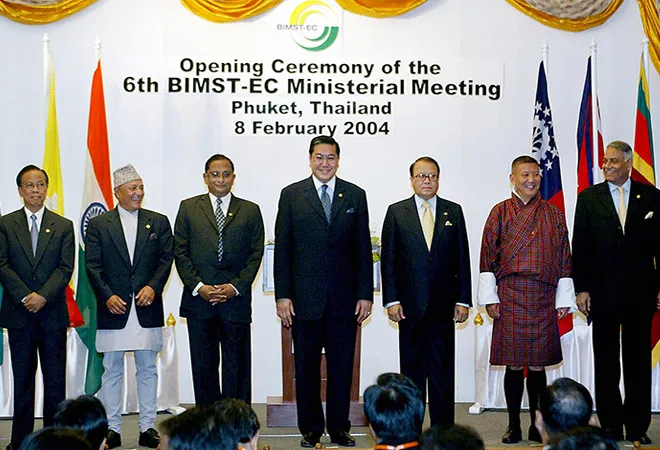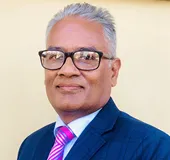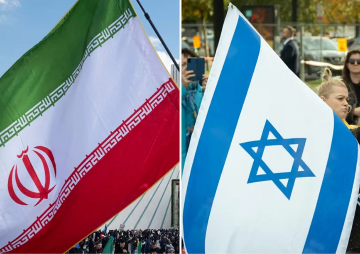
This article is part of the series — BIMSTEC in 2021.
Nepal joined the BIMST-EC in 1998 as an observer within one year of establishment of this regional body. This facilitated the Nepalese delegation to participate in various level meetings and understand the dynamics of the organisation, despite observers not being allowed to participate in substantive discussions and to present their views.
The sixth ministerial meeting of BIMST-EC held in Phuket in February 2004 was a watershed event in the evolution of trade and economic cooperation under the regional framework. This meeting was organised just a month after signing the South Asian Free Trade Agreement (SAFTA) in Islamabad on 6 January 2004. Those South Asian countries having a stake in both organisations were ebullient in making inroads to a larger free trade area passing from South Asia to two Southeast Asian nations — Myanmar and Thailand.
A Nepalese delegation led by Bhekh B. Thapa, Ambassador at Large of the Ministry of Foreign Affairs, was sent to participate in the ministerial meeting in Phuket. The author was also a member of the delegation and represented the Ministry of Industry, Commerce and Supplies in the capacity of Joint Secretary, in the International Trade Division. The delegation included the Foreign Secretary; office bearers of the Ministry of Foreign Affairs; representatives from the Ministry of Finance, Law and Justice; and the Nepalese Ambassador posted in Bangkok, amongst others. The meeting was held in a resort in Phuket. It was a back-to-back event of the commerce ministers, foreign ministers, secretaries, and joint secretaries who are represented at various levels of the institutional mechanisms of the organisation.
Those South Asian countries having a stake in both organisations were ebullient in making inroads to a larger free trade area passing from South Asia to two Southeast Asian nations — Myanmar and Thailand.
Nepal, in the observer status, was participating in various meetings of the organisation and was keeping abreast of the developments taking place in advancement of the organisation’s agenda. In context of Nepal’s pursuit for extending the reach to larger regional communities, the Phuket meeting was considered an appropriate opportunity to join the organisation as its full member. However, the signing of the framework agreement on free trade area was not anticipated during the event, which later appeared as a new revelation in the wake of the finalised legal text of the agreement. Some of the catchy moments of the event were:
Dilemma over signing the free trade agreement: Initially, the Nepalese delegation were a bit perplexed with the impromptu proposal of signing the framework agreement during this three-day meeting. The agreement contained three major provisions related to trade in goods, investment, and trade in services. Clearances from the cabinet was also not obtained for this particular task beforehand. The onus lay on the head of the delegation to either sign or not sign the document. A separate conclave of the Nepalese delegation was organised in order to make a decision in sorting out this dilemma. As a representative of the trade ministry, I made a briefing on the content of the framework agreement, which I had been following from the very beginning. My submission largely remained that this is a framework agreement that contains only a skeleton of the tasks to be further negotiated by the trade negotiating committee (TNC). The real task lies in negotiating the agreement on trade in goods, dispute settlement mechanisms, rules of origin, investment, and trade in services. Our head of delegation exhibited sound judgment and dexterity by getting verbal clearance from the capital in a short period, which made it possible for Nepal to become one of the original signatories of the free trade agreement.
The real task lies in negotiating the agreement on trade in goods, dispute settlement mechanisms, rules of origin, investment, and trade in services.
Bangladesh signed the agreement at a later date through a protocol: The last round of negotiation held to finalise the framework agreement hit a snag due to minor differences in the content of the agreement. Least developed countries delegations, particularly the Bangladeshi delegation, wanted to include the provision of revenue compensation mechanisms in the text of the agreement similar to the SAFTA agreement signed a month earlier. This is a provision where the non-LDC member countries are bound to compensate loss of revenue to the least developed countries incurred due to reduction in tariff for a stipulated period. This provision, although contained in the SAFTA agreement, was never implemented.
There were divergences of opinion in the meeting with regard to this proposal and the differences persisted. In view of this, the Bangladeshi delegation deferred from signing the agreement in Phuket; rather they opted for signing the agreement through a protocol three months later.
Renaming the organisation: With the entry of Nepal and Bhutan in the group, the nomenclature of the organisation had to reflect the addition of two new members. Initially, ‘BIMSTEC’ was an acronym formed by cumulating the initial alphabet of the initial five member countries. A panel of delegation members was formed to discuss the issue and to come up with the right nomenclature. It was realised that adding two more alphabets and giving a new name to the organisation would look awkward. Hence, a new idea to rename the organisation with the same alphabets but with a different meaning was mooted. Thus, the name ‘Bay of Bengal Initiatives for Multi-Sectoral Technical and Economic Cooperation’ was suggested and adopted by the meeting. This made insignificant changes in the previous name, merely by removing the hyphen in between from BIMST-EC.
The Sixth BIMSTEC Ministerial Meeting and the preceding meetings of senior officials were held in a very friendly manner. The Thai Prime Minister Thaksin was there to observe the signing ceremony. The Commerce Minister of Thailand, Watana Muangsook, often used to make amusing remarks during the evening dinner. I recall that in the course of advocating for freer trade, Minister Watana expressed that there should be no restriction in market access of agricultural goods, which has distinct advantages to Thai export. He said, “If restrictions are imposed, the FTA would mean Fool Them All and not Free Trade Area.” This prompted a good round of laughter among the delegates sitting across the table.
The views expressed above belong to the author(s). ORF research and analyses now available on Telegram! Click here to access our curated content — blogs, longforms and interviews.




 PREV
PREV


